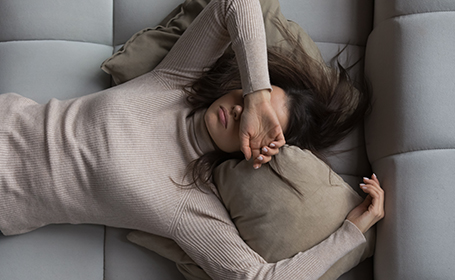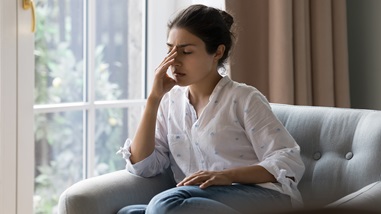
Does endometriosis cause fatigue?
Consultant Gynaecologist David Griffiths from The Ridgeway Hospital talks about endometriosis and fatigue, and offers advice to help manage the condition
Does endometriosis cause fatigue?
The short answer is yes. Endometriosis is a common and perplexing condition. Approximately 1 in 10 women will suffer with endometriosis at any time from the start of their first period until the menopause.
A recent study found that twice as many women with endometriosis experience fatigue compared with women who did not have the condition. This was even after the researchers factored in other causes of tiredness, such as work stress, depression, pain, weight and parenting.
Interestingly, the study also reported that women who experience endometriosis and fatigue were seven times more likely to have insomnia and four times more likely to be depressed compared to women who did not have the condition.
Fatigue can cause a significant impact on the home situation, relationships and working lives of sufferers.
There are many causes of fatigue, and endometriosis is certainly not one of the most commonly thought of causes.
The condition is frequently misdiagnosed and patients often suffer in silence. In my clinic, I see numerous women who have been diagnosed previously with irritable bowel syndrome (IBS), chronic fatigue syndrome and ME. Some have few menstrual problems as they are using hormonal contraception which was originally started for period cramps.
It takes, on average, 7.5 years after the onset of symptoms for women to get a diagnosis. Unfortunately, there are many women suffering with the debilitating symptoms of endometriosis who have been misdiagnosed.
How is endometriosis diagnosed?
The only definitive way to diagnose endometriosis is with a laparoscopy, also known as keyhole surgery.
A small cut will be made in your tummy and a camera will be passed into your pelvis to confirm presence of the condition.

Symptoms to look out for
Endometriosis can have a range of symptoms such as heavy and painful periods, discomfort during and after intercourse and infertility. However, the condition can also cause abdominal bloating and general fatigue which are very common and often overlooked.
Some women experience all of the symptoms, whereas some may only have one or two symptoms. Ironically, women with minimal disease often have the most severe symptoms, whereas those with extensive disease may experience fewer symptoms.
Symptoms of endometriosis can include:
- Pelvic discomfort or pain
- Painful periods
- Pain during intercourse
- Painful urination or bowel movements
- Fatigue
- Bloating
- Nausea
- Infertility
It takes, on average, 7.5 years after the onset of symptoms for women to get a diagnosis.

What should I do if I think I may have endometriosis?
If you are experiencing extreme fatigue or any other symptoms and think you might have endometriosis, speak to your GP to discuss your concerns. They will be able to refer you to a gynaecologist who specialises in endometriosis.
What can I do to help with fatigue?
Chronic fatigue is a chronic condition and, therefore, there are no quick fix treatments. There are, however, many ways you can help fight the battle of perpetual tiredness.
Here are some ways that may help:
Having a diagnosis is the first step
It can often be very hard to accept that the fatigue is real and potentially long term.
As fatigue is often associated with insomnia, pain, depression and work related stress, it’s important to try to address all aspects which may be contributing to your fatigue.
Try and eat healthily
A diet rich in plant based foods is essential and the avoidance of processed foods can make a huge difference to your energy levels.
Some of my patients find that an energising smoothie in the morning is helpful, but it will be different for everyone. If you don't know where to start, speak to a dietician for advice.
Listen to your body
Exercise when you feel able and do not try to overexert yourself. Find an exercise that works for you and that you genuinely enjoy.
Take rest days
This can obviously be difficult if you are working. It may be worth looking at your job to see if there are any modifications that can be made, such as a change in hours. Many of my patients find working for themselves the best option.
Start a hobby
When you are feeling fatigued, have a hobby that you enjoy and makes you feel good about yourself without being too intense physically, for example playing an instrument or drawing.

Tags
How do I book an appointment?
If you're concerned about symptoms you're experiencing or require further information on this subject, talk to a GP or see an expert consultant at your local Circle Hospital.